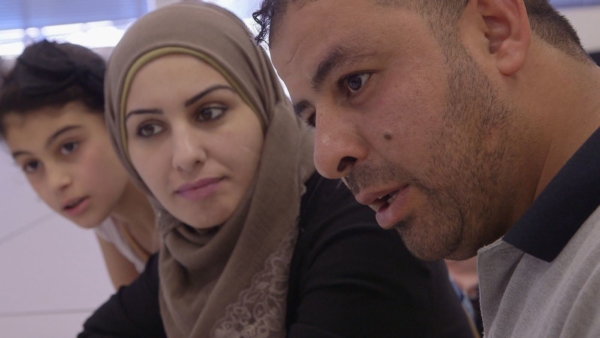This well-meaning, if strangely uninvolving documentary, focuses on the plight of Syrian refugees who fled to America because of their country’s devastating civil war. It centers on four families who are relocated to Baltimore, where from the start they seem anxious and overwhelmed by their new surroundings. They get assistance from a nonprofit agency, the International Rescue Committee, or the IRC, but they clearly have an uphill climb ahead, as most have a small grasp of the English language. In addition, they all must be self-sufficient within eight months of their arrival, as that’s as long as the IRC will help them.
For three of the families, the husbands had been the main breadwinners. This changes as minimum-wage jobs are the best they can apply to at first. Among the women who juggle part-time work and child-rearing is Madiha. There’s also a pair of high school age sisters who only just reunited with their parents after living in Jordan for the past two years, during which time they became highly independent and self-directed for their age. They arrive in America with the goal of getting accepted into university here.
The film constantly jumps from subject to subject, rarely lingering long enough for the scenes to have an impact. An early exception involves a visit to a typical suburban supermarket, in which one of the men, Mohammad, quickly finds himself overwhelmed by the wide selection and labels he cannot read. Director Alexandra Shiva also seems sympathetic towards the children, hinting that they might be suffering from psychological trauma without necessarily invading the families’ privacy.
This period of transition seems particularly difficult for the husbands, who were well paid back in Syria but now must take whatever work they can find. They have skills translatable to industries such as construction and auto repair. They just lack the job connections, English-language skills, and proper licensing. They’re also not used to the idea of their wives in the workforce; when an IRC worker mentions this is the norm in America, Khaldoun, a former auto mechanic, responds with, “Over my dead body.” This seemingly sets the stage for some future conflict, but then he is surprisingly supportive when his wife, Yasmen, takes steps towards greater autonomy, such as learning how to drive.
Instead of intrafamilial or intergenerational disagreements, most of the film’s tension seems to be between the refugees and the by-the-book staff of the IRC, who seem devoid of empathy at times. But Shiva includes enough scenes at the nonprofit’s bustling headquarters to emphasize that the case workers are overwhelmed with persons in need, and so they really have no time to coddle. We also hear from an employee who expresses conflicted emotions over having to quash her clients’ views of themselves professionally in terms of what kinds of jobs they can expect to have.
The film becomes more optimistic as the women awaken to opportunities they never considered while back home. There are also scenes of genuine uplift, such as when Madiha makes a friend with an American Christian, which leads to a life-changing opportunity. Unfortunately, in the process of juggling so many protagonists and story lines, the film glosses over them, which is especially a shame as the aforementioned example proves that despite a certain degree of anti-immigrant sentiment—we get to see the families’ reactions to President Trump’s first ban on immigration from seven Muslim majority countries—some Americans welcome them.
Ultimately, This Is Home: A Refugees Story is cautiously optimistic about its subjects’ fates—and America’s soul.

















Leave A Comment